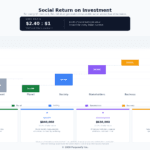Microsoft Introduces AI-Powered Tools for Sustainable Business Strategies to Sustainability Platform

Microsoft Sustainability Manager is rapidly evolving with the power of generative AI, offering unprecedented capabilities for data analysis and informed decision-making.
What-if Analysis: Forecast Carbon Reduction Strategies
A new AI-powered feature, what-if analysis, helps organizations forecast the impact of business practice changes on their carbon footprint. This intelligent tool uses historical data and existing calculation models to predict the outcomes of both current and potential strategies.
For instance, a sustainability manager named Susan can leverage what-if analysis to compare the environmental effects of various initiatives her team is considering. This data-driven approach empowers Susan and her team to prioritize actions that will have the most significant positive impact on their company’s carbon reduction goals.
Key functionalities of what-if analysis include:
- Customization: Tailor AI modeling using an organization’s specific carbon activity data and receive forecasts in metric tons of CO2 equivalent (MTCO2e).
- Predefined Scenarios: Apply pre-built scenarios to streamline analysis according to organizational needs.
- Adaptability: Accommodate the unique needs of any organization with customizable scenarios that span all three scopes of emissions (Scope 1: Direct emissions from owned or controlled sources; Scope 2: Indirect emissions from purchased electricity, heat, or steam; Scope 3: All other indirect emissions from a company’s activities, not included in Scopes 1 or 2).
Streamline ESG Document Analysis with Copilot
Document analysis, powered by Microsoft Copilot, allows users to seamlessly upload and query environmental, social, and governance (ESG) documents in natural language. This feature saves time and effort by automatically extracting relevant information from uploaded documents.
For example, Lisa, a procurement officer at Contoso Coffee Company, can leverage document analysis to compare sustainability reports from potential suppliers. By asking Copilot questions about each company’s carbon reduction goals and transparency commitments, Lisa can make informed decisions aligned with Contoso’s sustainability strategy.
Document analysis empowers organizations at any stage of their sustainability journey, from understanding complex reporting requirements like the Greenhouse Gas Protocol’s Scope 3 Calculation Guidance to comparing supplier reports.
Identify Patterns and Visualize Water and Waste with Key Influencers
Detailed insights are crucial for effective decision-making. Key influencers, an analytics enhancement, now provides visibility into patterns that drive water and waste fluctuations. This empowers organizations to identify the most significant factors contributing to increases or decreases in water withdrawal, discharge, consumption, waste generation, disposal, and recovery.
ADEME Emission Factors Ensure Accurate Calculations for French Organizations
Emission factors are essential for calculating emissions and developing control strategies. ADEME (Agence de la transition écologique) emission factors, now available in Sustainability Manager, provide essential data for estimating emissions associated with various activities in France.
The benefits of ADEME emission factors include:
- Precise Calculations: Granular data specific to the French context enhances the accuracy of emission calculations, allowing organizations to make data-driven decisions about emission reduction strategies. For example, a manufacturing facility in Lyon can use ADEME emission factors tailored to the region’s energy mix to precisely estimate its carbon footprint. This precision allows for targeted reduction strategies, such as switching to a renewable energy source.
- Localized Insights: Organizations operating in France can align their sustainability efforts with local standards. ADEME emission factors ensure that emission assessments reflect the unique environmental context of the region. For instance, a vineyard in Bordeaux can use ADEME emission factors to evaluate emissions related to vine cultivation, winemaking, and distribution. These localized insights empower informed decisions, such as optimizing transportation routes or adopting renewable energy sources.
- Holistic Approach: ADEME factors contribute to a comprehensive understanding of an organization’s carbon footprint across its entire lifecycle, not just direct emissions. Consider a Parisian hotel. By factoring in emissions from guest transportation, food sourcing, and waste management, the hotel gains a holistic view. This informs choices like sourcing local produce or implementing energy-efficient lighting, contributing to a more sustainable operation.
Related Article: CO280, Aker Carbon Capture Partner with Microsoft to Enhance Carbon Removal in North America
Estimate Waste Generation for Sustainability Progress
Sustainability Manager now includes waste estimation (preview), a new capability that helps organizations estimate waste quantities through intensity-based factors. This feature allows users to define factors for estimating waste disposed or recovered, ultimately calculating total waste generated.












